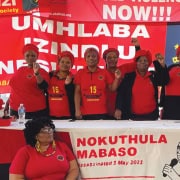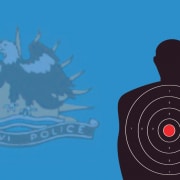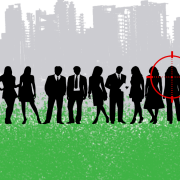|
Getting your Trinity Audio player ready...
|
By Janine Erasmus
The life of an activist in South Africa is as fraught with danger as that of a whistle-blower. Both stand up to corruption and in so doing, put their safety, and even their lives, on the line. Both suffer abuse, ridicule, and harassment from the perpetrators of corruption as well as the frustrated public.
Activists endure this as part of their daily work, and one could easily argue that whistle-blowing is also a full-time occupation which takes over every aspect of the whistle-blower’s life.
This country is a particularly hostile environment in which to work as an activist.
At Corruption Watch too, our activists often face harassment and scorn. We see it not only in distressing face-to-face encounters, but in social media too, where people feel it appropriate to make offensive or belittling comments about our work.
As the website and content editor, I do not often step out from behind my laptop to encounter whistle-blowers – or as we call them, reporters. But other Corruption Watch staff members have experienced their unfair share of intimidation.
One colleague recounted a story of how a whistle-blower harassed him and our receptionist verbally and then came in person to the office to carry on with the harassment. “He told me how useless I was, to the point I just left him in the boardroom and asked our investigator to see him.”
Another colleague was frightened by a reporter who came to the office. While she was talking to him, he began to use abusive language and pound the floor with a stick he had brought. “I could see that whenever I asked a question I was making him very angry, to a point that he would hit me with that stick.”
The same colleague, with a fellow CW staff member, was threatened by yet another person who came to the office to lay a complaint. Having decided there was safety in numbers, they were shocked to hear him use abusive language towards them and threaten to “bewitch us and make us disappear because he is a witch. I have never been so scared like that day so we had to listen to him and could not ask any question.”
Asking questions is how we get to the bottom of the experiences our reporters bring to us. Feeling too afraid to ask questions hampers the process and in the end, puts the reporter at a disadvantage.
Corruption Watch staffers understand the fears and frustrations of reporters. We deal with them every day. But it’s hard to get a reciprocal understanding from those who are desperate for justice, and this is one of the saddest aspects of how corruption has stripped people of dignity and hope.
“When I see that the conversation wants to get out of hand, I just keep quiet and let them speak their mind, as I can see that sometimes it’s a case of suffering with the same issue for a long time.”
As a matter of personal safety, colleagues now together consult with reporters, where one leads the session and the other supports. “This allows us an opportunity to get as much information as possible.”
Having people in the next room also boosts safety, a colleague said. “Another factor is that they come to CW as their last resort, so if we cannot assist they get so angry to a point that they start to threaten us that they will meet you outside the office. Some even go as far as accusing CW of being corrupt and receiving bribes from the government or private sectors.”
As a long-serving CW staff member, I can attest to the fact that we do not take bribes, nor do we particularly favour the public or private sectors or any entity within them. But whistle-blowers, driven by sheer desperation, often lash out at whoever is in the room with them, as they strive to be heard. We understand this and accept that it is part of the job, but it does not make it easier.
The organisation itself is often bullied and ridiculed, especially on social media. In November we asked for donations to support our work as part of a fundraising campaign. This is an ordinary activity that every civil society organisation in the world undertakes on a regular basis, yet one would have thought we were committing a crime. We were even likened to the governing ANC, in the sense of taking people’s money out of greed.
These are just a few of the stresses that our people deal with every day. Their experiences are disturbing – but other activists have suffered much worse.
Risking life and limb
“When we challenge the political conditions of oppression by thinking and speaking for ourselves, organising ourselves, disrupting oppression and insisting that we must be able to participate in all spaces where relevant discussions are held and decisions are taken, we face slander and violence,” says Sibusiso Zikode, president of shack dwellers’ movement Abahlali baseMjondolo, in the foreword to a recent report published by the Centre for Applied Legal Studies (Cals).
The report, titled Victimisation Experiences of Activists in South Africa, is the second such research report published by Cals, following the first one released in 2018. It documents the victimisation experiences of activists across a range of sectors, including environment and land activists, those working in the community and gender justice areas, student activists, and whistle-blowers.
Activists based in rural, peri-urban, urban areas in Gauteng, Eastern Cape, Western Cape, Free State, Mpumalanga, North West, KwaZulu-Natal, and Limpopo were interviewed.
“The common trends identified in the victimisation of human rights defenders across different fields of activism include harassment, intimidation, unlawful arrests, death threats and the use of legal processes to silence activists,” the report notes. “The impact of victimisation is far-reaching and long-lasting. Victimisation adversely impacts the lives, psychological wellbeing, and livelihoods of activists and their families. “
The report aims not only to expose the victimisation of activists, but also to share various tactics and strategies employed by activists to counter victimisation, including digital security training and partnerships with organisations that can provide emergency assistance. It concludes with recommendations on how activists can be supported and how the state and state entities can address and eradicate activist victimisation, including fulfilling its international obligations to protect human right defenders.
“If commitment to justice, to one’s country and the world – the dignity of all people – means death, then this is the end of our hard-won constitutional democracy. Rights on paper mean nothing when insisting on our humanity means that we can be murdered with impunity.
“We are paying a price for exposing corrupt politicians,” says Zikode.
Activists targeted more often
According to Global Witness and other organisations, more and more activists are being killed each year. there is a steady increase in the number of activists being killed. In 2019, the organisation reported that 212 environmental human rights defenders were killed, a number that rose to a shocking 277 in 2020. Human rights group Front Line Defenders reported in 2021 that 358 human right defenders were killed.
In South Africa environmental activists suffer the same patterns of victimisation. The murder in January 2023 of human rights lawyer Thulani Maseko sent a wave of outrage across the Southern African region and prompted organisations and individuals alike to call for swift justice. The murders of community activists Nokuthula Mabaso and Thuli Ndlovu of Abahlali BaseMjondolo, environmental activist Fikile Ntshangase of the Mfolozi Community Environmental Justice Organisation, and whistle-blower Babita Deokaran are just a few among an increasing number of women killed for their activism.
Abahlali has lost 22 leaders to assassinations over the past 15 years – these include Ayanda Ngila, Siyabonga Manqele and Lindokuhle Mnguni in 2022 alone. Little has been done to hold the perpetrators to account.
Constitutional and legislative requirements – which place an obligation onto government to fulfil them – to ensure the rights of everybody to privacy, freedom to expression, assemble, and associate, dignity, and life, are seemingly overlooked when it comes to activists and whistle-blowers. This is another, extremely valid reason why the whistle-blowers Corruption Watch encounters are so stressed and anxious.
“Despite South Africa being a constitutional democracy, civic space continues to shrink,” the report notes. “Activist victimisation can and should urgently be eradicated.”
Findings and analysis – a broad overview
Cals found that death threats against environmental activists – particularly those working in mining-affected communities – was “disturbingly common”. Activists are discredited, intimidated, or litigated against. Some activists must relocate frequently to stay ahead of the would-be perpetrators; others must go into hiding. Many suffer abuse from the police – “The use of the police to advance individualistic and political gains is one of the main forms of victimisation experienced by activists that is left unaccounted for. Activists reported to have been victimised by the police at the behest of mining corporations, traditional authority, and even local state officials.”
Community activists – those who advocate for better living conditions, delivery of basic services, and employment – are no less targeted. This is because the struggle for marginalised persons, including the struggle for equality, opportunity, and freedom from poverty is itself one aspect of a larger political game.
“The struggle to have the voices of communities heard has, however, been very politicised. This has meant that activists who are marked as ‘troublemakers’ from opposition parties or those who are not ‘toeing the line’ within their own party often end up assassinated, facing death threats and forced into hiding to avoid being killed.”
Police abuse in this sector is also rife, and perpetrators are not above using political tensions to further other forms of victimisation. Again, some activists are in hiding or move around a lot.
Gender justice activists face many forms of victimisation, including discrediting, insults, gender-based violence, and humiliation, the report notes. Bullying, cyber-bullying, body-shaming, and other forms of harassment are common. Women who speak out about being raped are insulted and accused of lying – sometimes by fellow activists.
“Although social media has proven to be a powerful tool for gender justice activists to run campaigns and raise awareness about gendered issues, it is also where they are often met with push-back.”
Furthermore, living in a patriarchal society – which enables toxic masculinities, rape culture, and other harmful cultural and social norms – makes the work of gender justice activists much more difficult.
“Gender justice activists find themselves having to fight both for the causes they champion and for their place in the world as activists. The attack on women and queer gender justice activists is therefore double-barrelled, driven by the fact that they are women or queer persons and that they dare to be activists.”
Meanwhile, student activists fighting for the decolonisation of universities and a more favourable environment in which to study are equally vilified, as are other young people asking for better living conditions. A post on Corruption Watch’s own social media pages regarding a youth march for addressing unemployment, corruption, and discrimination, among others, drew unwarranted comments such as “terrorists in the making”.
But as the report notes, “Colonised education has stripped them of everything that resembles themselves including their culture, language, and manner of socialisation. Through this, colonial education entrenched itself within sexism, homophobia, classism, racism, and patriarchy, amongst others.”
For their efforts, student activists are targeted by university management, who single them out and threaten them, and not only are the students victimised, but so are lecturers who support them. Police are often brought in to use violence against protesting students – one such protest in Johannesburg resulted in the death of a bystander.
Students are often suspended and end up being unable to finish their studies, while being arrested and charged for various crimes can come back to haunt them. “Although for most students these charges were later dropped, their arresting and charging was used by universities to justify instituting disciplinary proceedings against them. Furthermore, despite the charges later being withdrawn, the physical and psychological impact of being repeatedly arrested, assaulted by police and kept in holding cells cannot be erased by the withdrawal.”
Finally, whistle-blowers take on enormous risks when they decide to come forward with evidence and allegations of corruption – this is possibly the most “overlooked form of activism”, according to the report. Despite legislation that is supposed to protect them, the physical security of whistle-blowers is challenged, and there are adverse financial consequences when they, instead of the perpetrator, are harassed in their place of work, suspended, and possibly dismissed.
“Whistle-blowing also has an impact on the emotional and psychological well-being of the individual. Employers often use their power to discredit, frustrate, and dismiss whistle-blowers, making it even more difficult for people to come forward with information.”
The conundrum for South Africa, notes the report, is that the country is dealing with crippling levels of corruption, but at the same time, the environment for whistle-blowers is hostile and dangerous.
“Fortunately, widespread conversations have begun, including with the South African Human Rights Commission, on how to better protect whistle-blowers.”
Resisting and addressing victimisation
Corruption Watch staff have developed some ways of feeling safer when dealing with the public. They include not being alone in meetings with people who come to the office, travelling with security, especially for community and outreach events, and advocating for mental health support.
The report provides recommendations that can be implemented by mining companies, police and private security companies, the National Prosecuting Authority, higher education institutions, Chapter 9 institutions, and government, on how victimisation of activists may be addressed. In addition, it puts forward ways in which public interest legal organisations can support activists.
It also makes several suggestions on how to avoid being victimised – based on the experiences activists have shared with Cals during the research phase for the report. Some of the tactics that activists have adopted to resist repression, the report reveals, include the following:
- Changing cellphone numbers frequently to avoid receiving threatening phone calls and messages, being traced or digitally surveilled;
- Changing where they live frequently, if there is impending danger, to avoid being tracked down and to remain in hiding;
- Using safe houses for activists whose personal safety is under threat; •
- Having allies within their communities who can warn them of imminent danger, for instance activists reported having community members who alert them if they are on a hit list or if there are rumours of an imminent attack against them;
- Knowing where and when the hotspots for attacks are as certain areas or times may be unsafe for activists. For example, during local election season, community activists may be at an increased risk of attack and may need to take extra precautionary measures;
- Partnering with well-known social movements who may increase the number of activists attending demonstrations or other activities marking dissent. For example, working with national networks or movements may assist in increasing the numbers of people protesting which makes it more difficult for perpetrators to target individuals;
- Working closer with larger organisations and NGOs who may be able to provide immediate assistance should an activist be in danger. For example, the Southern African Human Rights Defenders Network can assist in relocating an activist whose physical safety is threatened;
- Ensuring activism work and demonstration of activism is publicised in the media as much as possible as a form of protection for activists. For example, involving the media during protests;
- Having a database of organisations that can provide immediate assistance in instances of victimisation. For example, having the contact details of the Right2Protest Project hotline should an activist be arrested during a protest; •
- Ensuring that day-to-day tasks and movement is not predictable, if there is suspicion that an activist is being surveilled;
- Constant movement building within the community to deter victimisers from being able to divide communities. For example, hosting frequent meetings to discuss issues and how to tackle issues as a movement;
- Sharing information with other partners to better understand the rights implicated in expressions of dissent. For example, working with NGOs for capacity building activities that may include learning about how to access information held by the state or private entities and what can be done if such information is denied;
- Familiarising themselves with the processes to be followed when demonstrating dissent, such as giving notice when convening a protest Boosting security at the primary place of residence should it become necessary;
- Starting video or voice recording when arrested by police in order to have evidence, particularly during protests;
- Being cautious of how whistleblowing takes place. For example, avoiding whistleblowing publicly and ensuring anonymity is maintained as far as possible when using reporting channels;
- Being aware of their emotional and mental wellbeing. For example, being conscious of what triggers you, including how far you can go in advocating for the issue at hand. Being cautious of when you may need to stop or take a break from activism; and
- Understanding digital safety and security. For example, attending digital safety training and understanding cyberbullying and how to counter it.








